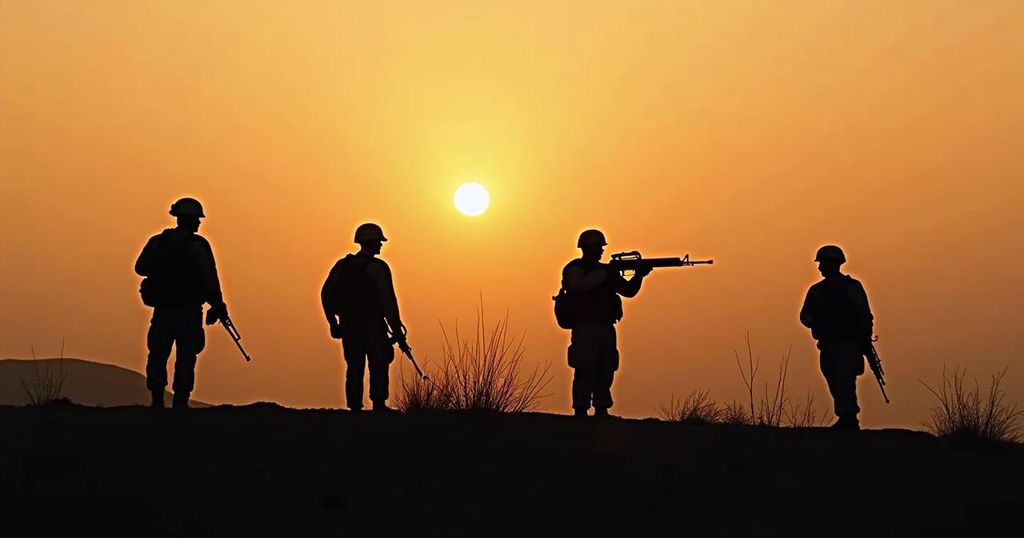Iraqi forces have chosen to remain uninvolved in Israel’s conflicts with Hezbollah and Iran, prioritizing humanitarian assistance instead of military engagement, while ensuring that U.S. interests are not targeted. Prime Minister al-Sudani has rallied support for de-escalation and warned against actions that might lead to Iraq’s destabilization amidst rising tensions in the region.
Iraqi forces affiliated with Tehran have chosen to refrain from involvement in Israel’s conflicts against Hezbollah and Iran, acknowledging the risk that participation could exacerbate the instability in Iraq and jeopardize their existing power. In lieu of military engagement, Iraqi leaders and commanders from Iranian-supported factions have expressed a commitment to focus on humanitarian assistance for those impacted by the ongoing war in Lebanon. They have assured that U.S. interests and military installations in Iraq and Syria will not be targeted for the time being. The recent escalation in violence, highlighted by Israel’s ongoing military actions in Gaza and Lebanon, has resulted in aggressive counteractions from regional actors, including missile strikes on Israel from Iran. In the face of potential Israeli retaliation against Iraq, leaders within the Iraqi government have warned that military involvement could lead to detrimental consequences for the nation’s political and economic structure. Prime Minister Mohammed Shia al-Sudani has engaged in numerous discussions with political leaders and military commanders to clarify the current situation and advocate against Iraq’s participation in the regional conflict. During these dialogues, he sought support from international diplomats and neighboring state leaders to halt Israeli aggression. Despite the excessive military actions from Israel, including the controversial targeting of high-profile leaders, Iraqi officials remain concerned about the implications for Iraq, predicting that Israel might soon carry out strikes against well-defined targets within the country, particularly those associated with the Popular Mobilization Forces (PMF). In preparation for further escalations, Iraqi military forces have been placed on high alert, and commanders within the paramilitary groups are under instructions to avoid entanglement in the conflict unless directly provoked by Israeli attacks. The leadership of the PMF convened to emphasize the importance of maintaining military restraint while taking precautions to secure their operational integrity. Throughout these developments, Iraq’s fragile political environment necessitates a cautious approach, as leaders strive to manage both internal stability and external pressures while navigating the complexities of regional conflicts.
This article discusses the evolving dynamics of the Iraqi military and political response to the heightened military actions between Israel, Hezbollah, and Iran. It outlines the strategic decision by Iraqi forces, particularly those allied with Iran, to abstain from participation in the ongoing regional conflicts, juxtaposed against the backdrop of escalating violence. The Iraqi government has expressed a commitment to humanitarian efforts rather than military confrontation, while also maintaining a posture of readiness against potential Israeli strikes, which are perceived as imminent. Prime Minister al-Sudani’s diplomatic outreach highlights the intricate balancing act faced by Iraq in response to external aggression and internal stability.
In summary, Iraqi forces have opted to avoid entanglement in the ongoing conflicts involving Israel, Hezbollah, and Iran, focusing instead on humanitarian aid and support for affected civilians. Despite the external pressures and threats of Israeli military action, the Iraqi government, under the leadership of Prime Minister al-Sudani, emphasizes the importance of caution and restraint to preserve Iraq’s political and economic stability. The situation remains tense, with high alert status among military forces and a commitment to prevent any escalation that could further destabilize the region.
Original Source: www.middleeasteye.net







